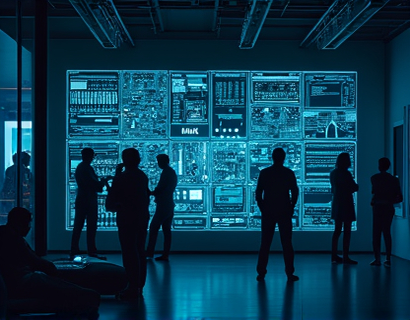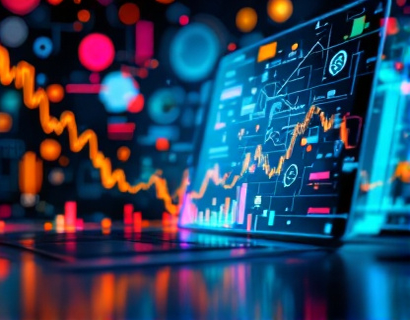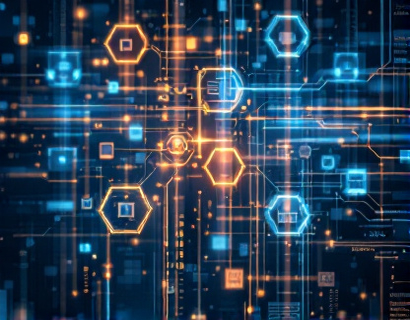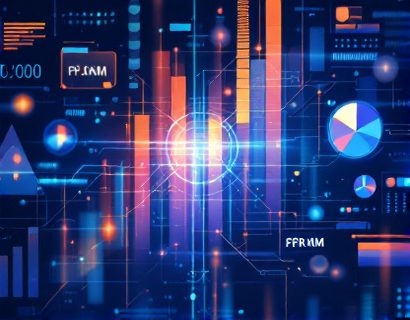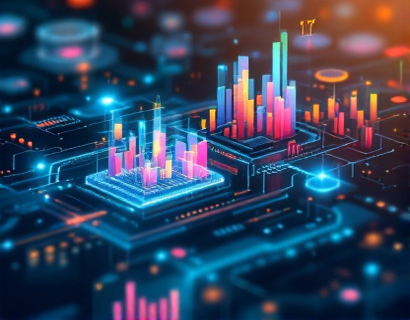Crypto and AI: Pioneering Enhanced Digital Engagement for Next-Gen Ecosystem Solutions
The intersection of blockchain technology and artificial intelligence (AI) is giving rise to a new era of digital engagement, one that promises to revolutionize how we interact with technology and each other. This fusion is not just a technological curiosity but a powerful force driving innovation and growth across various sectors. As tech enthusiasts and early adopters, understanding this synergy is crucial for anyone looking to stay ahead in the rapidly evolving digital landscape.
The integration of blockchain and AI is creating more secure, transparent, and efficient systems. Blockchain's inherent properties of decentralization, immutability, and transparency complement AI's capabilities in data analysis, pattern recognition, and predictive modeling. Together, they are paving the way for enhanced user experiences and new opportunities that were previously unimaginable.
Enhanced Security and Trust
One of the most significant benefits of combining blockchain and AI is the enhancement of security and trust in digital interactions. Blockchain provides a tamper-proof ledger that ensures data integrity, while AI can detect and mitigate potential security threats in real-time. This dual-layer approach is particularly valuable in industries where data security is paramount, such as finance, healthcare, and supply chain management.
For instance, AI-driven algorithms can analyze transaction patterns on a blockchain network to identify anomalies that may indicate fraudulent activity. By integrating machine learning models with blockchain, systems can automatically flag and respond to suspicious behavior, reducing the risk of security breaches and increasing user trust.
Personalized User Experiences
AI's strength lies in its ability to process vast amounts of data and derive meaningful insights. When combined with blockchain, this capability can be harnessed to create highly personalized user experiences. Blockchain ensures that user data is securely stored and managed, while AI can analyze this data to offer tailored recommendations, services, and interactions.
In the context of digital ecosystems, this means that users can enjoy customized interfaces, content, and services that adapt to their preferences and behaviors. For example, a blockchain-based platform could use AI to curate a news feed that reflects a user's interests, ensuring that the information presented is relevant and valuable.
Decentralized Intelligence
The concept of decentralized intelligence is a fascinating outcome of the blockchain-AI synergy. Traditional AI systems rely on centralized data repositories, which can be vulnerable to single points of failure and privacy concerns. Decentralized intelligence, on the other hand, distributes data and computation across a network, leveraging the power of multiple nodes to enhance processing capabilities and resilience.
Blockchain serves as the backbone for this decentralized approach, providing a secure and transparent way to manage data sharing and computation. AI models can be trained and run on a decentralized network, ensuring that no single entity has control over the entire system. This not only enhances security but also promotes collaboration and innovation among participants.
Smart Contracts and Automated Processes
Smart contracts, self-executing contracts with the terms directly written into code, are another area where blockchain and AI converge to create powerful solutions. AI can optimize the execution of smart contracts by analyzing conditions and predicting outcomes, ensuring that agreements are fulfilled efficiently and accurately.
In business processes, this combination can automate complex workflows, reduce manual intervention, and minimize errors. For example, in supply chain management, AI can predict demand and optimize inventory levels, while smart contracts can automatically trigger payments and updates based on predefined conditions. This level of automation not only streamlines operations but also builds trust among all parties involved.
Enhanced Data Privacy and Ownership
Data privacy is a growing concern in the digital age, and the blockchain-AI combination offers promising solutions. Blockchain's decentralized nature ensures that data is not stored in a single location, reducing the risk of large-scale data breaches. AI can further enhance privacy by implementing advanced encryption techniques and ensuring that user data is used ethically and transparently.
Users can maintain control over their data, deciding who can access it and for what purposes. AI-driven tools can help manage consent and data sharing preferences, ensuring that users have full ownership and agency over their personal information. This approach aligns with regulatory requirements and builds trust, making it an attractive solution for both users and organizations.
Innovative Financial Solutions
In the financial sector, the combination of blockchain and AI is leading to innovative solutions that improve efficiency, reduce costs, and enhance customer experiences. AI can analyze market trends and predict financial outcomes, while blockchain ensures secure and transparent transactions.
Decentralized finance (DeFi) platforms are a prime example of this synergy. These platforms offer a range of financial services, from lending and borrowing to trading and asset management, all built on blockchain technology. AI algorithms can optimize trading strategies, manage risks, and provide personalized financial advice, all within a secure and transparent framework.
Moreover, the use of stablecoins, which are cryptocurrencies pegged to stable assets, can be enhanced by AI to maintain price stability and reduce volatility. This creates a more reliable and user-friendly financial environment, attracting a broader range of participants.
Challenges and Considerations
While the potential of blockchain and AI is immense, there are several challenges and considerations that must be addressed. Scalability remains a significant issue, as both technologies require substantial computational resources. Developing more efficient algorithms and infrastructure is essential to support widespread adoption.
Regulatory frameworks are another critical aspect. As these technologies evolve, governments and regulatory bodies need to create clear guidelines to ensure compliance and protect consumers. Collaboration between technologists, policymakers, and industry leaders is vital to navigate the regulatory landscape effectively.
Additionally, there is a need for greater education and awareness among users. Understanding the benefits and risks associated with blockchain and AI is crucial for informed decision-making. Initiatives to demystify these technologies and provide accessible resources can help bridge the knowledge gap.
Future Prospects
The future of blockchain and AI is bright, with numerous possibilities on the horizon. As these technologies continue to mature, we can expect even more innovative applications across various domains. From healthcare, where AI can analyze medical data stored on a blockchain for more accurate diagnoses, to education, where blockchain can ensure the integrity of academic credentials, the potential is vast.
The integration of blockchain and AI is not just a technological advancement but a paradigm shift in how we approach digital engagement. By leveraging the strengths of both technologies, we can create more secure, efficient, and user-centric solutions that drive growth and innovation in the digital ecosystem.
For those interested in exploring this exciting frontier, platforms like the one described earlier offer a glimpse into the possibilities. By harnessing the power of blockchain and AI, we can build a more connected, transparent, and empowering digital world.
















